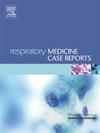Response of EGFR-mutated pulmonary pleomorphic carcinoma to pembrolizumab
IF 0.7
Q4 RESPIRATORY SYSTEM
引用次数: 0
Abstract
Pulmonary pleomorphic carcinoma (PPC) is a rare and aggressive lung malignancy with limited treatment options. While immune checkpoint inhibitors (ICIs) have shown promise in treating PPC, evidence regarding their efficacy in epidermal growth factor receptor (EGFR)-mutated cases remains scarce. We report a case of a woman in her 70s diagnosed with PPC harboring EGFR L858R + E709K mutations and high expression (95 %) of programmed death-ligand 1 (PD-L1). After relapsing from concurrent chemoradiotherapy for a Pancoast tumor, the patient received osimertinib as second-line therapy. Despite an initial response, rapid disease progression necessitated left lower lobectomy, confirming PPC diagnosis. Subsequent treatment with pembrolizumab achieved notably tumor response. Although Grade 3 immune-related colitis developed, it was successfully managed with prednisolone, allowing completion of six courses of pembrolizumab. This case demonstrates the potential efficacy of ICIs in EGFR-mutated PPC, even after epidermal growth factor receptor -tyrosine kinase inhibitor (EGFR-TKI) failure and highlights the importance of appropriate adverse event management. Our findings suggest that ICIs may be a viable treatment option for EGFR-mutated PPC patients, particularly those with high PD-L1 expression.
egfr突变的肺多形性癌对派姆单抗的反应
肺多形性癌(PPC)是一种罕见的侵袭性肺恶性肿瘤,治疗方案有限。虽然免疫检查点抑制剂(ICIs)已显示出治疗PPC的希望,但关于其在表皮生长因子受体(EGFR)突变病例中的疗效的证据仍然很少。我们报告一例70多岁的女性被诊断为PPC携带EGFR L858R + E709K突变和程序性死亡配体1 (PD-L1)高表达(95%)。在Pancoast肿瘤同步放化疗复发后,患者接受了奥希替尼作为二线治疗。尽管最初有反应,但快速的疾病进展需要左下叶切除术,证实了PPC的诊断。随后的派姆单抗治疗取得了显著的肿瘤缓解。尽管发生了3级免疫相关性结肠炎,但强的松龙治疗成功,完成了6个疗程的派姆单抗治疗。该病例证明了ICIs对egfr突变PPC的潜在疗效,即使在表皮生长因子受体-酪氨酸激酶抑制剂(EGFR-TKI)失效后也是如此,并强调了适当不良事件管理的重要性。我们的研究结果表明,对于egfr突变的PPC患者,特别是那些PD-L1高表达的患者,ICIs可能是一种可行的治疗选择。
本文章由计算机程序翻译,如有差异,请以英文原文为准。
求助全文
约1分钟内获得全文
求助全文
来源期刊

Respiratory Medicine Case Reports
RESPIRATORY SYSTEM-
CiteScore
2.10
自引率
0.00%
发文量
213
审稿时长
87 days
 求助内容:
求助内容: 应助结果提醒方式:
应助结果提醒方式:


